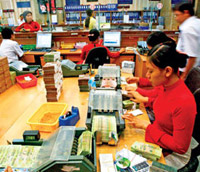INDOCHINA INTERNATIONAL CONSULTING CO., LTD
HO Add: 62L/36 Nguyên Hồng, Ward 11, Bình Thạnh District, HCMC - Vietnam
Biz Office Add: #48 Road No 11, Quarter 6, Hiệp Binh Chánh Ward, Thủ Đức, HCMC - Vietnam
®Source: http://viipip.com should be clearly quoted for any use of information extracted from our website.
Publication permit No: 60/GP-TTĐT , April 05, 2010.


A lot of joint stock banks began applying the new interest rates as of November 11. The rates have been lowered to nearly 13% per annum, while long term deposits of twelve months or more have seen the new interest rates of 10-12% per annum.
At Techcombank, the VND interest rates are now below 14.5% per annum for all terms of deposits. The highest rate is applied for three-month term deposit, at 14.35%, followed by 14.2% for 4-month term deposit, and 14% for 5-month term deposit.
VP Bank has also applied nearly the same interest rates as of November 11.
Big joint stock banks, including Asia Commercial Bank (ACB) and Sacombank, have cut interest rates sharply. At ACB, for example, the rate of 14% per annum is only applied for three-month term deposits, while the rates for other deposits are all below 14%.
In general, the VND deposit interest rates have decreased by 4-5% from the highest peak seen at the end of June 2008.
A new ground of interest rates has also been laid out among state owned banks and the equitised Vietcombank. The highest rate offered by Vietcombank is at 14% per annum, and the Bank of Investment and Development of Vietnam (BIDV) is at 13.5% per annum. However, Agribank applies relatively high interest rates, with the highest rate at 16% for a twelve-month term deposit.
Some joint stock banks still apply high interest rates in comparison with other banks’ rates. Saigon Commercial Bank (SCB), for example, offers the rates at over 15% for 1-9-month term deposits, with the highest rate at 15.8% per annum .
At Saigon-Hanoi Bank, if depositing VND 500 million and higher, depositors would still enjoy the high interest rates of 16.45%-16.6% for six-month term deposits.
Nguyen Phuoc Thanh, General Director of Vietcombank, said that the State Bank of
If the basic interest rate further decreases, the lending interest rates decrease, and banks would have to slash deposit interest rates further to cut down expenses. In the context of the oversupply of usable capital, it is reasonable to adjust the deposit interest rates at this moment.
According to the State Bank, the capital mobilization has been slowing down. In October, the total deposit balance at credit institutions reportedly increased by 2.42% more since September; lower than the 3.8% increase in September and 4.21% of the same period of 2007. Of this, the VND deposit balance just increased by 2.16% only, lower than the 4.39% increase in September, while the foreign currency balance increased by 3.18%, higher than the 2.09% increase in September.
Big banks said that the deposit growth since the beginning of the year has been obtained from the increase of deposits from the public. This shows that people have firm confidence on the banking system. Meanwhile, the deposits from businesses tend to decrease, which is explained by the fact that money has been injected in business instead of banks.
- FDI capital continues to pour into Vietnam (6/11/2025 1:20:33 PM)
- Thanh Hoa receives good news: Preparing to have an additional industrial park of up to 470 hectares, creating jobs for nearly 30,000 people (6/11/2025 1:15:09 PM)
- Industrial Park Real Estate: Waiting for the New Generation of FDI (6/11/2025 1:10:15 PM)
- A wealthy Vietnamese city will have two special economic zones after the merger (6/11/2025 1:04:42 PM)
- 30 billion USD capital FDI in Việt Nam by 2025, a series of "ông big" races to expand the land fund (6/11/2025 12:55:26 PM)
- the 2nd largest city in the North will start construction on an international economic zone (6/11/2025 12:50:20 PM)
- Japanese giant Sumitomo continues to want to build an industrial park in the countrys fourth smallest province. (6/11/2025 12:40:45 PM)
- 3 foreign corporations want to invest billions of dollars in Ba Ria - Vung Tau (6/11/2025 12:34:30 PM)
- Lotte Group member starts construction of nearly 1,000 billion VND logistics center in the province with the most industrial parks in Vietnam (6/11/2025 12:33:26 PM)
- Forming a regional center for manufacturing spare parts and components (6/11/2025 12:24:08 PM)
- Vietnams first wafer factory is about to start construction (6/11/2025 12:19:09 PM)
- Dong Nai attracts foreign investors (6/11/2025 12:13:27 PM)
- Tay Ninhs largest industrial park welcomes a $150 million high-end knitted fabric factory project (6/11/2025 12:11:00 PM)
- (6/11/2025 12:09:10 PM)
- Vietnam will become a destination for Chinese investors in the future (11/6/2023 1:03:19 PM)

- FDI capital continues to pour into Vietnam
- Thanh Hoa receives good news: Preparing to have an additional industrial park of up to 470 hectares, creating jobs for nearly 30,000 people
- Industrial Park Real Estate: Waiting for the New Generation of FDI
- A wealthy Vietnamese city will have two special economic zones after the merger
- 30 billion USD capital FDI in Việt Nam by 2025, a series of "ông big" races to expand the land fund










 ADB: Vietnam’s 2009 GDP growth to be highest in South East Asia
ADB: Vietnam’s 2009 GDP growth to be highest in South East Asia MGM Grand Ho Tram: Vietnam’s First ‘Las Vegas Style’ Integrated Resort
MGM Grand Ho Tram: Vietnam’s First ‘Las Vegas Style’ Integrated Resort Nha Trang’s Twin Towers project licenced
Nha Trang’s Twin Towers project licenced Foreign investors still have good opportunities in Vietnam
Foreign investors still have good opportunities in Vietnam Sierra Wireless gets a foot in Vietnam’s ICT market
Sierra Wireless gets a foot in Vietnam’s ICT market